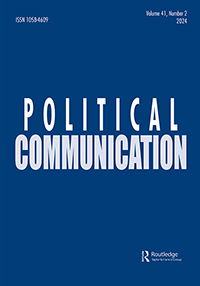Do Voting Advice Applications Affect Party Preferences? Evidence from Field Experiments in Five European Countries
IF 4.6
1区 社会学
Q1 COMMUNICATION
引用次数: 1
Abstract
ABSTRACT Voting advice applications (VAAs) are online tools that provide voters with personalized information on the extent to which their policy views match those of political parties or candidates. These tools have proliferated across advanced democracies in recent years and become integral parts of electoral campaigns, especially in multi-party systems. However, it remains unclear to what extent voters actually make use of VAAs to inform their voting preferences. We present new field-experimental evidence on the short-term effects of VAAs on party preferences from five European countries. We find consistent evidence that exposure to VAA advice leads voters to update their party preferences in line with the information provided. Furthermore, we find partial evidence that VAAs more strongly influence less politically interested and undecided voters. Overall, our results point to the potential value of VAAs as a mechanism to strengthen democratic representation and accountability.投票建议应用程序会影响政党偏好吗?来自欧洲五个国家实地实验的证据
摘要投票建议应用程序是一种在线工具,为选民提供个性化信息,说明他们的政策观点与政党或候选人的政策观点的匹配程度。近年来,这些工具在发达民主国家激增,成为竞选活动的组成部分,尤其是在多党制中。然而,目前尚不清楚选民实际在多大程度上利用VAA来告知他们的投票偏好。我们提供了五个欧洲国家关于VAA对政党偏好的短期影响的新的实地实验证据。我们发现一致的证据表明,接触VAA建议会导致选民根据所提供的信息更新他们的政党偏好。此外,我们发现部分证据表明,VAA对不太感政治兴趣和犹豫不决的选民的影响更大。总的来说,我们的研究结果表明,VAA作为一种加强民主代表性和问责制的机制具有潜在价值。
本文章由计算机程序翻译,如有差异,请以英文原文为准。
求助全文
约1分钟内获得全文
求助全文
来源期刊

Political Communication
Multiple-
CiteScore
13.90
自引率
2.70%
发文量
30
期刊介绍:
Political Communication is a quarterly international journal showcasing state-of-the-art, theory-driven empirical research at the nexus of politics and communication. Its broad scope addresses swiftly evolving dynamics and urgent policy considerations globally. The journal embraces diverse research methodologies and analytical perspectives aimed at advancing comprehension of political communication practices, processes, content, effects, and policy implications. Regular symposium issues delve deeply into key thematic areas.
 求助内容:
求助内容: 应助结果提醒方式:
应助结果提醒方式:


